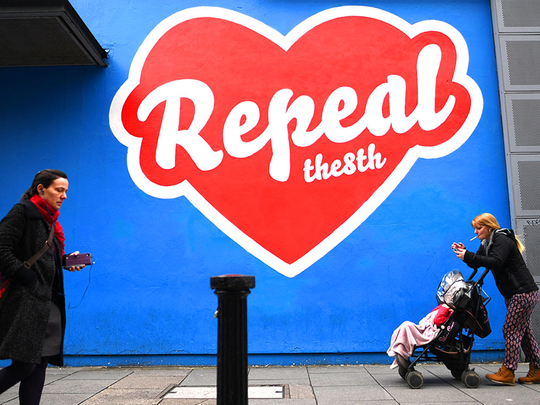
MADRID: The pain hasn’t gone away over these past five-and-a-half years. And there’s not a day that goes by that Andanappa Yalagi doesn’t think of his daughter, Savita Halappanavar, and how her death was so preventable.
Halappanavar died at a hospital in Galway, Ireland, in October 2012 from a septic miscarriage. Now, from his home in Karnataka, he is speaking out, hoping that Irish voters will change the anti-abortion constitutional ban that led to the death of his 31-year-old daughter.
Ireland is holding a referendum on abortion on May 25.
“I will watch this vote,” the father told The Irish Times. “I hope the people of Ireland will vote ‘yes’ for abortion, for the ladies of Ireland and the people of Ireland. My daughter, she lost her life because of this abortion law, because of the diagnosis, and she could not have an abortion. She died.”
Halappanavar’s death caused outrage at the time both in Ireland and in India. The dentist died at University College Hospital in Galway on October 28, 2012, a week after she was admitted with severe back pain and was miscarrying.
Both Halappanavar and her husband, Praveen, asked for an abortion to be performed. It wasn’t because the Eighth Amendment to Ireland’s Constitution guarantees the right to life of unborn children. Doctors could still detect a foetal heartbeat. She died a week later after her condition deteriorated, and she suffered septic shock and multiple organ failure.
Her husband moved to the United States two years later.
Three separate medical and legal inquiries into Halappanavar’s death identified serious mistakes in her treatment at the Galway hospital. One inquiry, led by Professor Sir Sabaratnam Arulkumaran noted best international practice would have been to terminate the pregnancy “in this clinical situation of inevitable miscarriage at 17 weeks … and infection in the uterus because of risk to the mother”.
Prof Arulkumaran is a Sri Lankan-born physician who is the former president of the Royal College of Obstetricians and Gynaecologists and is now president-elect of the British Medical Association.
Yalagi, a retired engineer, wants his daughter’s image to be used as a poster during the referendum campaign, and he said the abortion laws in Ireland should change.
“We are happy [that] people in Ireland remember Savita, and remember her when they are talking about abortion,” he said. “It is very good [that] people in Ireland are remembering how she died.”
He said he wants a ‘Yes’ result.
“I want people to remember her,” he said. “It is a long time. It is six years, and the law still has not changed.”












